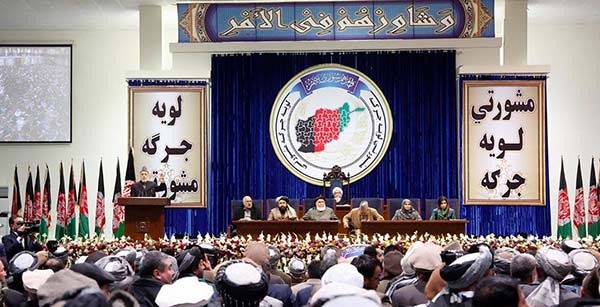Most Jirga Committees Want Deal Inked in 6 Weeks
KABUL - Afghan tribal elites concluded a four-day Loya Jirga on Sunday, endorsing the Bilateral Security Agreement (BSA) with the United States, which allows a residual U.S. troops to remain in Afghanistan beyond 2014.
A unanimous majority of the 2,500-member Jirga called on President Hamid Karzai to sign the document by the end of this year. But the Afghan president has laid out three pre-conditions to the U.S. before he will sig the security pact: transparent elections in April, no raids on Afghan homes and a breakthrough in talks with the Taliban.
Washington has said that it's "neither practical nor possible" to delay the signing. President Karzai in his speech on Thursday in the opening of the Jirga said that the BSA would be signed after the April elections.
"If there is one more raid on Afghan homes by U.S. forces, there is no BSA. The U.S. can't go into our homes from this moment onward," President Karzai said in his closing remarks at the Jirga on Sunday.
The issue of U.S. unilateral operations was the final point of contention between Kabul and Washington last week, but was put to rest at the Jirga as participants voted in favor of the agreement that allowed for America to launch its own missions under certain circumstances.
The Afghan president said he believed peace in Afghanistan is "first in the hands of the U.S. and secondly in the hands of Pakistan."
He said now that the Jirga has endorsed the document, he will continue bargaining with officials in Washington over his three pre-conditions.
The U.S.' residual forced post-2014 would be stationed in nine military bases in Afghanistan, according to the BSA, but representatives of central Bamyan province in the Loya Jirga requested an additional base in their province as well.
The U.S. is expected to keep roughly 10-15,000 troops in-country if the pact is finalized.
The Jirga has accepted that U.S. soldiers should be prosecuted under American criminal jurisdiction, while also still suggesting that an Afghan government representative should be present during any trial.
Article 13 of the accord, which addressed criminal jurisdiction over troops, was considered the most controversial element of the agreement. The same provision proved a deal-breaker in Iraq in 2011 when the U.S. was negotiating a similar pact with Baghdad.
The Jirga outcome also includes that the U.S. cannot have any prisons in Afghanistan and it must handover all Afghan detainees to the government of Afghanistan. This would likely lead to a continuation of the Kabul strategy of releasing militant prisoners in hopes of building good-will with the insurgency ahead of possible peace talks.
The U.S. insists the deal, which has taken months to negotiate, must be signed before the end of this year in order to secure plans for how many troops will remain in Afghanistan beyond 2014.
The U.S. government's special envoy for Afghanistan and Pakistan James Dobbins on Friday said that the security pact between the countries ought to be signed in the next few weeks.
"We feel strongly that the agreement ought to be signed as soon as it's approved by the Jirga and then it ought to be sent to the parliament and approved and this ought to occur at some time in the next few weeks," Ambassador Dobbins told TOLOnews.
"The Afghan people are anxious whether the United States and the international community remain committed to their security and wellbeing and frankly the American people and the international community are uncertain about whether the Afghan people really want us," he added.
The American-led NATO forces invaded Afghanistan in 2001 following the September 11 attacks in order to oust the Taliban regime and prevent terrorist groups like al-Qaeda from using Afghanistan as a base of operations. Twelve years later, as the coalition withdraws in the lead up to its self-set December, 2014 deadline, there are still around 100,000 foreign troops in Afghanistan, out of which 48,000 are said to be American.
The Afghan security forces currently number at around 350,000 men. They're greatest deficiency, according to experts, are logistics. Most are adamant about the U.S. and other coalition countries continuing to advise, train and assist the Afghan forces beyond 2014.
Though groups such as the Taliban and Hezb-e-Islami have come out in condimnation of the accord and the Jirga for considering it. The Taliban went so far as to threaten the lives of JIrga members who voted in favor of the agreement. (Tolo News)

